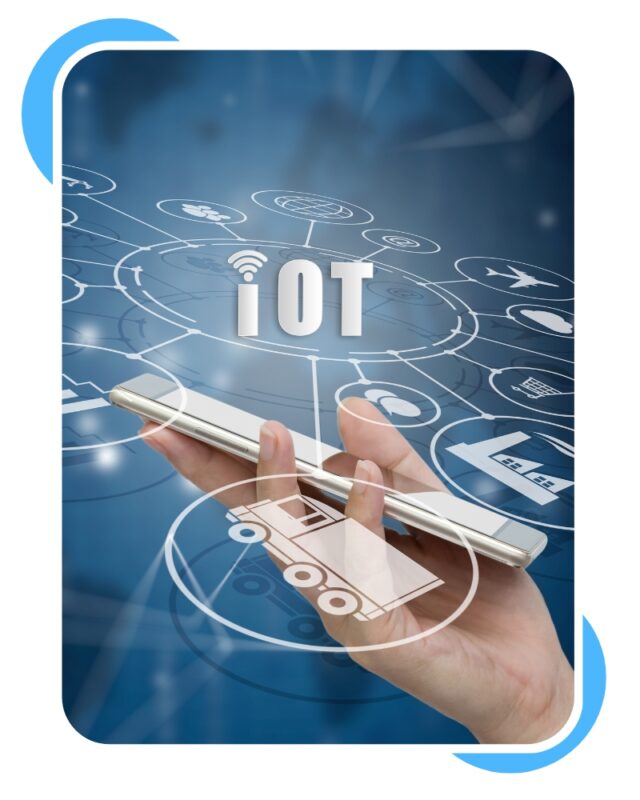
The Internet of Things (IoT) refers to connecting various devices and objects to the Internet and enabling them to communicate with each other. These devices can include everything from smartphones and wearable devices to household appliances, vehicles, and industrial machinery.
The IoT relies on sensors and other embedded technologies that allow devices to collect and share data in real time. This data can be used to improve the efficiency and functionality of these devices and enable new applications and services that were previously impossible. One of the key benefits of the IoT is that it allows for greater automation and control over physical systems.
For example, in a smart home, connected devices can be used to monitor and adjust heating and lighting systems and to alert homeowners to potential problems like water leaks or security breaches. The IoT also has critical applications in industrial settings, where it can be used to optimize supply chains, monitor equipment performance, and enhance workplace safety. In healthcare, the IoT is used to develop new medical devices and improve patient monitoring and care.

How To Learn the Internet Of Things?
Learning the Internet of Things (IoT) requires technical and practical skills. Here are some ways you can learn about IoT:
Online courses
Many online courses cover various aspects of IoT, from introductory classes to more advanced topics. Some popular platforms for online courses include Coursera, edX, and Udemy.
University courses
Many universities now offer courses and programs specifically focused on IoT, such as computer science, electrical engineering, or industrial design. Check the course catalogue of universities in your area or look for online programs.
Bootcamps
IoT boot camps are intensive training programs providing hands-on experience in building and deploying IoT devices. These programs typically last several weeks and are designed to teach participants the skills needed to develop IoT applications quickly.
Self-study
If you prefer to learn independently, many resources are available online to help you learn about IoT. These include books, tutorials, and online forums where you can ask questions and get feedback from other IoT enthusiasts.
No matter which approach you choose, learning about IoT will require a willingness to experiment, a curiosity about how things work, and a willingness to stay up to date with the latest technology trends. With the right mindset and a commitment to learning, you can develop the skills needed to create innovative IoT applications and devices.

Benefits of Learning the Internet Of Things
Learning the Internet of Things (IoT) can offer a variety of benefits, including:
Career opportunities
IoT is a rapidly growing field, and there is a high demand for skilled professionals who can design, build, and maintain IoT systems. Learning IoT can open up various career opportunities in software development, engineering, and data analysis.
Increased efficiency
IoT can help increase efficiency in various industries by automating tasks, optimizing processes, and improving resource management. For example, IoT sensors can monitor energy usage in buildings and adjust heating and cooling systems accordingly, leading to significant cost savings.
Improved safety
IoT can enhance security in various settings, from homes and workplaces to public spaces. For example, sensors can detect gas leaks or fires and automatically alert emergency services.
Innovative solutions
IoT enables the development of innovative solutions to complex problems, such as predicting equipment failures in industrial settings or developing intelligent transportation systems that can reduce traffic congestion and improve public transportation.
Personal development
Learning IoT can be a fulfilling and intellectually stimulating experience, allowing individuals to develop their technical and creative skills while contributing to developing new technologies and applications.
Overall, learning IoT can provide individuals with valuable skills and knowledge that can help them advance their careers, contribute to their communities, and positively impact the world.

Career After Learning Internet Of Things
Learning the Internet of Things (IoT) can open career opportunities in various industries. Here are some potential careers paths for those with IoT skills:
IoT developer
As an IoT developer, you would be responsible for designing and building IoT applications and systems. This could include developing embedded software, designing hardware components, and integrating sensors and other devices.
Data analyst
IoT generates large amounts of data, and companies need skilled professionals who can analyze this data to identify patterns, trends, and insights. As a data analyst, you would work with data from IoT devices and use data analysis tools and techniques to extract insights and help drive business decisions.
IoT architect
As an IoT architect, you would be responsible for designing and overseeing the implementation of large-scale IoT systems. This could involve designing the network architecture, selecting hardware and software components, and ensuring the security and scalability of the system.
Industrial automation engineer
IoT is revolutionizing industrial automation, and companies need engineers who can design and implement automated systems that incorporate IoT sensors and devices. As an industrial automation engineer, you would work on projects such as designing smart factories or implementing predictive maintenance systems.
Smart city specialist
As cities become increasingly connected, there is a growing need for professionals who can design and implement innovative city solutions. This could include developing IoT-enabled transportation systems, improving building energy efficiency, or designing intelligent waste management systems.
These are a few potential career paths for those with IoT skills. As IoT grows and evolves, skilled professionals will likely have even more opportunities.

Salary After Learning Internet Of Things in India
The salary for individuals with IoT skills in India can vary widely depending on their specific job title, experience level, and the industry in which they work. However, individuals with IoT skills can generally command higher salaries than those without these skills.
According to various sources, the average salary for an IoT developer in India is around INR 6-8 lakhs per year, with salaries ranging from INR 3-12 lakhs depending on the company and experience level. Data analysts with IoT skills can expect to earn INR 4-10 lakhs per year, while IoT architects may earn between INR 10-25 lakhs per year. Industrial automation engineers and competent city specialists with IoT skills can also expect to earn competitive salaries, ranging from INR 8-20 lakhs per year, depending on the company and experience level.
It’s worth noting that these are just rough estimates, and salaries can vary widely depending on the individual’s specific qualifications, experience, and job responsibilities. Additionally, as IoT continues to grow and evolve, there is likely increasing demand for skilled professionals, which could lead to even higher salaries.

How to Succeed in an Internet Of Things
To succeed in the Internet of Things (IoT), there are several vital things you can do:
Learn constantly
IoT is a rapidly evolving field; to stay ahead, you must constantly update your skills and knowledge. This can involve taking courses, attending conferences, and reading industry publications.
Develop interdisciplinary skills
IoT involves various disciplines, from software development to hardware engineering to data analysis. Developing interdisciplinary skills can help you become a more well-rounded IoT professional, making you more valuable to employers.
Focus on security
Security is critical in IoT, as connected devices can be vulnerable to cyber-attacks. Focusing on security can help ensure your IoT systems are safe and secure.
Collaborate with others
IoT projects often involve teams of professionals with different skills and expertise. You can learn from their experiences and contribute your skills and knowledge by collaborating.
Keep the end-user in mind
Ultimately, IoT is about creating solutions that meet end-users needs. Keeping the end-user in mind throughout the development process can help ensure that your IoT solutions are helpful, user-friendly, and meet real-world needs.
Stay up-to-date on industry trends
IoT is a dynamic and rapidly evolving field, and it’s essential to stay up-to-date on the latest trends and innovations. This can help you identify new opportunities and stay ahead of the competition.
By following these tips, you can increase your chances of success in the IoT field, whether you are a developer, engineer, analyst, or professional.
Common Challenges in Learning Internet Of Things
Learning the Internet of Things (IoT) can be challenging, and learners may encounter several common obstacles. Here are some of the most common challenges in learning IoT:
Complexity
IoT involves many technologies, including hardware, software, networking, and data analysis. This complexity can make it difficult for learners to understand how everything fits together.
Lack of standardization
IoT is still a relatively new field with no standardized best practices or protocols. This lack of standardization can make it challenging for learners to navigate the different technologies and systems involved in IoT.
Security concerns
IoT systems are vulnerable to cyber attacks, and learners must be aware of these security risks and take steps to mitigate them. This can involve learning about encryption, access controls, and other security measures.
u003cstrongu003eData managementu003c/strongu003e
IoT generates vast amounts of data, and learners must be able to manage and analyze this data effectively. This can involve learning about data storage, data analysis tools, and data visualization techniques.
Interdisciplinary skills
IoT involves various disciplines, from hardware engineering to software development to data analysis. Learners must develop interdisciplinary skills and understand how different technologies and systems work together.
Rapidly evolving technology
IoT is a rapidly changing field, and new technologies and protocols are constantly being developed. Learners must be able to keep up with these changes and adapt to new technologies as they emerge.
By being aware of these common challenges and taking steps to address them, learners can increase their chances of success in the IoT field. This may involve seeking out mentorship, taking courses, and staying up-to-date on the latest developments in IoT.

Advantages and Disadvantages of Internet Of Things.
Advantages of the Internet Of Things
1. Increased efficiency: IoT allows for the automation of many processes, which can lead to increased efficiency and productivity. This can help businesses reduce costs and increase profitability.
2. Improved safety: IoT can monitor and manage real-time safety systems, which can help prevent accidents and improve safety for workers and the public.
3. Enhanced customer experiences: IoT can create personalized and seamless customer experiences, which can help businesses improve customer satisfaction and loyalty.
4. Greater insights and analytics: IoT generates vast amounts of data, which can be analyzed to gain insights into business operations, customer behaviour, and other vital factors. This can help businesses make better-informed decisions.
5. New revenue streams: IoT can enable businesses to create new products and services, opening up new revenue streams and opportunities.
Disadvantages of the Internet Of Things
1. Security risks: IoT devices are vulnerable to cyber attacks, leading to data breaches, system failures, and other security risks. This can be a significant concern for businesses and individuals.
2. Privacy concerns: IoT devices can collect vast amounts of personal data, raising concerns about privacy and data protection. This is particularly relevant in healthcare, where sensitive personal information is often ordered and shared.
3. Interoperability issues: IoT devices often use different protocols and standards, making integrating them with existing systems and infrastructure challenging.
4. Complexity: IoT involves many technologies and disciplines, making it challenging for businesses and individuals to understand and implement.
5. Cost: IoT can be expensive for small and medium-sized businesses. This can be a barrier to adoption for some organizations.
By being aware of these advantages and disadvantages, businesses and individuals can make informed decisions about whether or not to adopt IoT technologies and how best to manage the associated risks and challenges.

FAQs Related to the Internet Of Things (IoT)
Sure, I would be happy to help! Here are some frequently asked questions related to the Internet Of Things (IoT)
IoT stands for “Internet of Things.” It refers to the network of physical devices, vehicles, home appliances, and other items embedded with sensors, software, and connectivity, which enable these objects to connect and exchange data over the internet.
IoT devices use sensors and other hardware components to collect data transmitted over the internet to a central server or other devices. The data can be analyzed to control the devices or provide insights into the environment or other systems.
IoT devices include smart thermostats, fitness trackers, smart home appliances, connected cars, industrial sensors, and healthcare monitors.
IoT can increase efficiency, improve safety, enhance customer experiences, more significant insights and analytics, and new revenue streams.
IoT challenges include security risks, privacy concerns, interoperability issues, complexity, and cost.
Popular IoT platforms include Amazon Web Services IoT, Microsoft Azure IoT, and Google Cloud IoT.
Skills required for a career in IoT include knowledge of hardware and software engineering, data analytics, networking, cybersecurity, and project management.
Industries adopting IoT technologies include healthcare, manufacturing, retail, agriculture, transportation, and energy.
You can learn IoT through online courses, university courses, boot camps, and self-study. It is also helpful to seek out mentorship and stay up-to-date on the latest developments in the field.
The future of IoT is expected to involve increased adoption and integration of IoT technologies into a wide range of industries, as well as the development of new applications and use cases.
